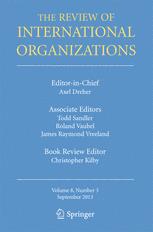

The Review of International Organisations (RIO) is looking to publish a Special Issue on the Causes and Consequences of International Conditionality Policies, and we would like to invite you to submit an article to the issue.
The policy background of this Special Issue is almost half a century of international conditionality policies around the globe. Since the 1970s, numerous international organizations, most notably the International Monetary Fund (IMF), the World Bank (WB) and the European Union (EU), have operated conditionality policies to gain positive leverage over political and economic reforms. They have shifted towards increasingly legalized and constraining conditionality schemes as contractual preconditions for IO accession, association, financial bailouts, credit lines, etc. Those conditions may comprise broad macroeconomic adjustment measures (e.g., fiscal consolidation, inflation targets, debt) or more specific microeconomic structural reforms in the direction of market liberalization (e.g., trade liberalization, privatization, deregulation).
According to the IMF, such systems of conditionality are designed to promote national ownership of strong and effective policies. The logic informing such policies is simple: If target countries want to achieve certain benefits (usually cash, policy concessions, or membership to an organization), these could and should be exchanged for political and/or economic reforms. In other words, international organizations often employ hard-powered incentives to induce specific policy reforms by national governments. But do all such conditionality arrangements produce the desired effects? What are the scope conditions for the success or failure of such programs? If, as it seems, failure does sometimes occur, what are its causes and how is it addressed by the relevant parties? Furthermore, how does the design and effectiveness of conditionality schemes compare among different IOs?
In light of the latest theoretical and empirical developments, the study of conditionality is constantly evolving. The aims of this Special Issue will be to (i) showcase state-of-the-art theories, empirical strategies, conceptualizations, and measurements of the causes and the consequences of IO conditionality policies, (ii) present new explanations for the varying scope and content of conditionality and compile new insights into the evolution and the effects of international conditionality policies, and (iii) investigate more closely the links between program design and implementation and take current debates forward by bridging the different strands of the literature pertaining to the various IOs.
More specifically, we would like to solicit contributions that do at least one of the following:
- Propose new concepts, measurement techniques, and empirical strategies that can help resolve methodological problems in the study of IO conditionality;
- Seek to explain the causes and the consequences of IO conditionality programs as well as highlight the links between program design and implementation;
- Study explicit comparisons in the design and implementation of conditionality policies across IOs (e.g., IMF, WB, EU).
The deadline for Special Issue submissions is October 11, 2020, although early submissions are also welcome and will be reviewed upon receipt. Submissions should be made through Editorial Manager (editorialmanager.com/roio/) indicating that the submission is for the Special Issue on Conditionality.











